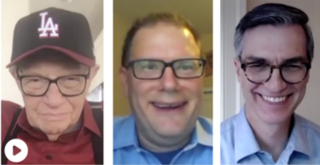Anxiety
The Strengths of a King: What I Learned From Larry King
A personal journey of strengths, anxiety, and hope.
Posted January 26, 2021

Larry King passed away on January 23, 2021.
“Are weaknesses the opposite of character strengths?” asked Larry King.
I paused for a moment. Was the legendary Larry King really asking me a question? He had interviewed 50,000 people from world leaders to rock stars, from the inspirational to the infamous, and now he’s asking me about character strengths?
What led up to this point? As a tribute to Larry, I’ll self-disclose my inner experiences that immediately led up to the interview and offer some remarks on the interview itself. You can watch the entire interview from July 2020 here.
Emotionally it was difficult. Knowing I was going to be interviewed by a living icon in a week or two, my nervousness peaked. I felt it as flurries of generalized fear, where it was difficult to pin down specific thoughts such as “I’m not good enough,” “I’m going to fail,” or “this will be a disaster.” I was not riddled with those sorts of thought patterns. Rather, my mind had a drive focused on wanting to represent my organization (the VIA Institute on Character) well, to represent the larger field of positive psychology well, and of course, to represent myself well. I felt it as a vague pulling in my chest, accompanied by an increase in my heart rate at the thought of the interview.
I wanted to be honest, authentic, with my responses while also brave to take action with my words and to pull along expressions of zestful, hopeful energy and social intelligence that I figured would be important for the interview. I drew on my experience in conducting interviews, in 900 presentations, and in higher intensity discussions.
Those reflections offered me a useful vantage point. But, more concretely and more helpful in the moment, I turned to my character strengths. I turned to planning. I wanted to ensure my hope, love, honesty, perspective, and appreciation were present. Therefore, right before the start of the interview, I would center myself with mindful breathing — accepting feelings as they are in the present while focusing and connecting on my breath. I would also engage in strengths priming which means I would remind myself of my character strengths and how to use them just prior to the challenging experience.
On the evening of the interview, I prepped in the green room, reviewing last-minute logistics with staff about my camera and lighting. We reviewed how I would not be engaging in niceties with Larry, rather I would be plunged right into the interview with a question. There were 15 minutes to spare so I would now turn to my mindful breathing and strengths priming. Suddenly, one of the producers popped into the green room:
“We’ve got to get Ryan in there now!”
One of her colleagues, who had been prepping me in the green room, responded, “We still have 15 minutes, right?”
“No, we need Ryan now. Something has come up with Larry, and we need Ryan to get in the studio!”
“Uh, OK,” she responded.
It’s not that I had much of a choice. “Yes, that’s not a problem,” I added. “I’ll head there now.”
Just then I had the fleeting thought — what if I just shut down my entire laptop and set up here? I could just flip it down and walk out of the room. No more pressure. My mind rushed to not only how ludicrous the thought was but the layers of negative consequences of such an action, not to mention I’d be missing out on what would likely be a wonderfully positive experience. As that solitary thought stream — lasting about one second in toto — evaporated, I sprang into action. I was to leave the green room arrangement and log into a new studio room.
I then realized — despite my use of substantial prudence strength for this whole experience — I had forgotten two things: One of my phones sitting five feet from me could receive a telemarketer call leaving a message that would be heard by everyone. And, second, I had a meditation bell programmed on my laptop to go off every hour on the hour, and now that I was being brought in early to the interview, the bell would go off after the first questions were asked.
Normally, these obstacles would not be difficult to tackle, but knowing that now Larry King was waiting for me and was in a rush of some kind, I had a new layer of tension. I knew I could not leave either of these obstacles unattended. As I logged into the studio room, I yanked the power from my landline and thankfully was able to quickly disable the meditation app (which I had not disabled before). Camera positioning OK. Lighting alright. Hair casual and in place. Clothes arranged with no food crumbs or lint in view. Whimsical vintage Pez dispensers organized neatly in the background. Ready.
I’m not sure how many of Larry’s 50,000 interviewees had to stand, if any, but that’s what I decided to do. For several months, I’d been working from a standing desk and decided this might be a symbol of upright attentiveness, of “taking a stand” for character strengths, and for prioritizing a healthy behavior.
I was on, and soon, the questions began: “What are strengths?” Larry asked with a softball opening.
I’m known as someone who directly and honestly attempts to answer virtually any question people ask me. But here, at the very first question, with probably the most prolific and famous interviewer in recent decades, I decided to go off course.
I ignored his question and started with a character strength — gratitude. I explained my gratitude to Larry for his persevering impact on the world through his interviews over the decades offering news, entertainment, and insights into the human condition. I finished my interruption with a bow and then moved on to answer his question. I spoke of the many kinds of strengths that people have, such as talents, interests, and skills, and highlighted how it’s strengths of character that are likely most central to humans.
Larry was joined for the interview by co-anchor James Pawelski, a leading positive psychology scholar and professor at the University of Pennsylvania. Together, they tossed a range of questions my way such as, “How are strengths related to well-being?” “How do we nurture the strengths of others?” And “As a nation, what character strengths do we need most now?”
Then, we came to one of the most powerful activities in all of positive psychology — the experience of a Character Strengths 360. This intervention involves coming to understand ourselves through the eyes of others. Pawelski had arranged for several family members and friends of Larry to identify his character strengths — and as the activity goes — offer a rationale or story to support each strength spotted. Most prominent were Larry’s curiosity, humor, and perseverance as evidenced in his interview style and tremendous lifelong work ethic; and his love and forgiveness as noted by many friends and family members who interacted with him daily.
The most challenging question for me came when Larry offered a double-layered question — he asked me to share about my latest two books — and also to “help him” with his weakness of not being able to say “no” to people. I decided to skip right to his difficulty. I had not expected this and it’s not a straightforward answer. My message rested in the suggestion that he use his signature strengths as a new lens by which to see the problem.
We were soon headed to a conclusion. The experience did not “fly by” nor did it painfully trudge along. Like most things in life, it was somewhere in the middle. I was there — the whole time — with my anxiety and with my strength of hope, while turning to gratitude, social intelligence, honesty, and self-regulation — a mix of my signature, middle, and lower strengths.
Larry’s closing comments for the interview still reverberate in my mind. He noted:
“You’ve been a great guest and thanks for the kind words too, Ryan. I really appreciate it. Now, I’ve gotta go say ‘yes’ to somebody!”
Interestingly, Larry had closed the interview with one of his top character strengths — humor. He also helped us come full circle in our interview by concluding with where we started — gratitude.
Thank you, Larry. You will be missed. And you will be remembered for your inspiring strengths of character.
Watch the full interview by Larry King and James Pawelski of Ryan Niemiec, courtesy of Positive Voices.




